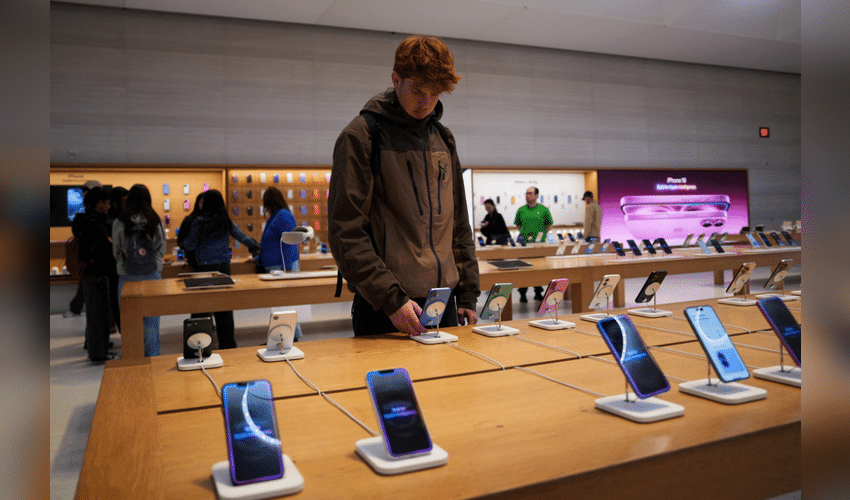Technology
Apple revenue prediction exceeds estimates; tariff costs expected to reach 1.1 billion dollars.

Apple has projected higher-than-expected revenue for the quarter ending in September, boosting investor confidence despite CEO Tim Cook warning that U.S. tariffs will increase costs by 1.1 billion dollars during the period. This announcement led to a rise in Apple’s stock price. The tariffs, which are a key part of President Donald Trump's trade policy, already cost Apple 800 million dollars in the June quarter. These rising costs prompted some customers to buy iPhones earlier than usual, contributing to Apple's strong third-quarter performance. According to LSEG data, the company surpassed sales expectations by the largest margin in at least four years.
Despite the tariff concerns, Apple remains optimistic about growth. Chief Financial Officer Kevan Parekh stated that revenue growth for the current quarter is expected to be in the mid to high single-digit range, which would exceed analyst forecasts of 3.27 percent growth to 98.04 billion dollars. For the quarter ending June 28, Apple reported revenue of 94.04 billion dollars, nearly 10 percent higher than the previous year, and above the expected 89.54 billion. Earnings per share reached 1.57 dollars, also topping forecasts of 1.43 dollars. Following the strong forecast, Apple shares rose 3 percent in after-hours trading.
iPhone sales grew by 13.5 percent to 44.58 billion dollars, beating expectations of 40.22 billion. To reduce the impact of U.S. tariffs, Apple has been moving production outside China, sourcing iPhones from India and manufacturing other products like Macs and Apple Watches in Vietnam. Although many Apple products are still exempt from tariffs, the final rates remain uncertain. Sales in the Americas region, including the U.S., climbed 9.3 percent to 41.2 billion dollars. In Greater China, where Apple had earlier faced delays in launching AI features, sales increased to 15.37 billion dollars, surpassing expectations of 15.12 billion. This marked a turnaround from the previous quarter’s decline in China sales. Cook noted that part of the improvement came from a government subsidy program in China that boosted smartphone sales.
In an interview with Reuters, Cook said Apple set seasonal records for upgrades of iPhones, Macs, and Apple Watches. About 1 percentage point of the 9.6 percent growth in sales was due to early purchases made ahead of expected tariff hikes. Negotiations between the U.S., China, and India are ongoing. Trump has indicated that India could face a 25 percent tariff as early as Friday. However, analysts believe India will still offer cost advantages to Apple in the long term. Emarketer analyst Jacob Bourne said that early demand due to tariff uncertainty was anticipated, but Apple's strong performance during a normally slow quarter still stands out, particularly with iPhone growth.
Beyond tariffs, Apple is facing stiff competition in the premium smartphone market from companies like Samsung. In the software space, Google is integrating AI rapidly into its Android system. While tech giants like Microsoft and Nvidia have seen their stock values soar due to AI developments, Apple shares have dropped 17 percent in 2025. Investors are concerned about Apple's slower progress in adopting AI. Cook stated that while Apple delayed releasing an AI-powered version of Siri, the company is making steady progress. He added that Apple is significantly increasing its investments in AI, although it has not yet matched the large-scale spending seen from other tech firms.
"Apple has always focused on making advanced technology simple and accessible, and that principle drives our approach to AI," Cook said. Apple is also dealing with regulatory challenges in Europe that may affect its App Store business. Nonetheless, revenue from services including the App Store, music, and cloud storage reached 27.42 billion dollars, surpassing the estimated 26.8 billion. Sales of wearables like AirPods and Apple Watches were 7.4 billion dollars, slightly below the expected 7.82 billion. Mac sales hit 8.05 billion dollars, ahead of the 7.26 billion projection, while iPad sales fell short at 6.58 billion dollars versus an expected 7.24 billion. Gross margins for the third quarter were 46.5 percent, above the estimated 45.9 percent. Apple forecast margins between 46 percent and 47 percent for the upcoming quarter, again beating analyst expectations.



